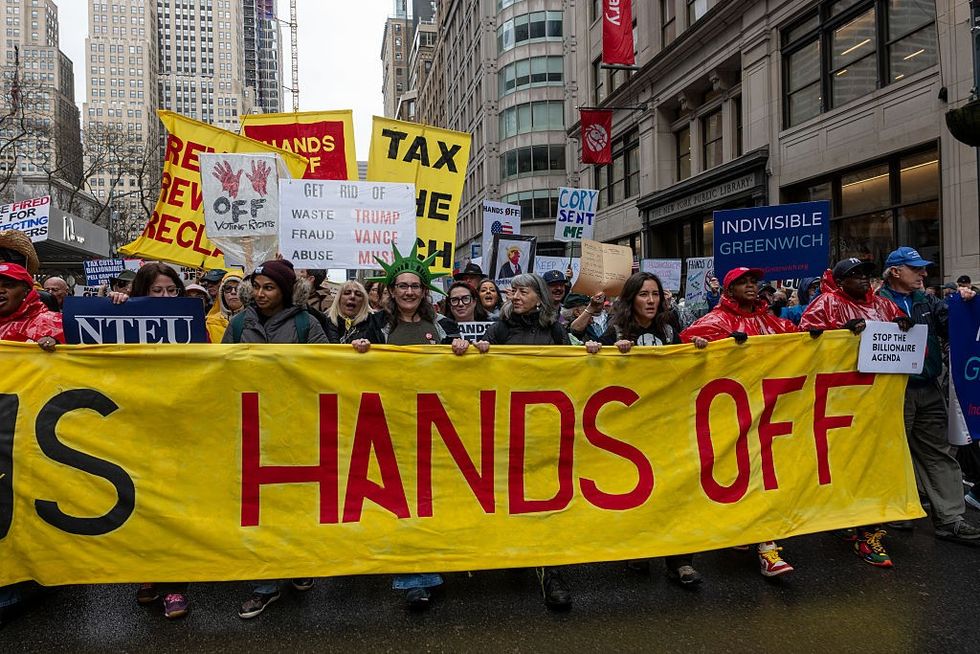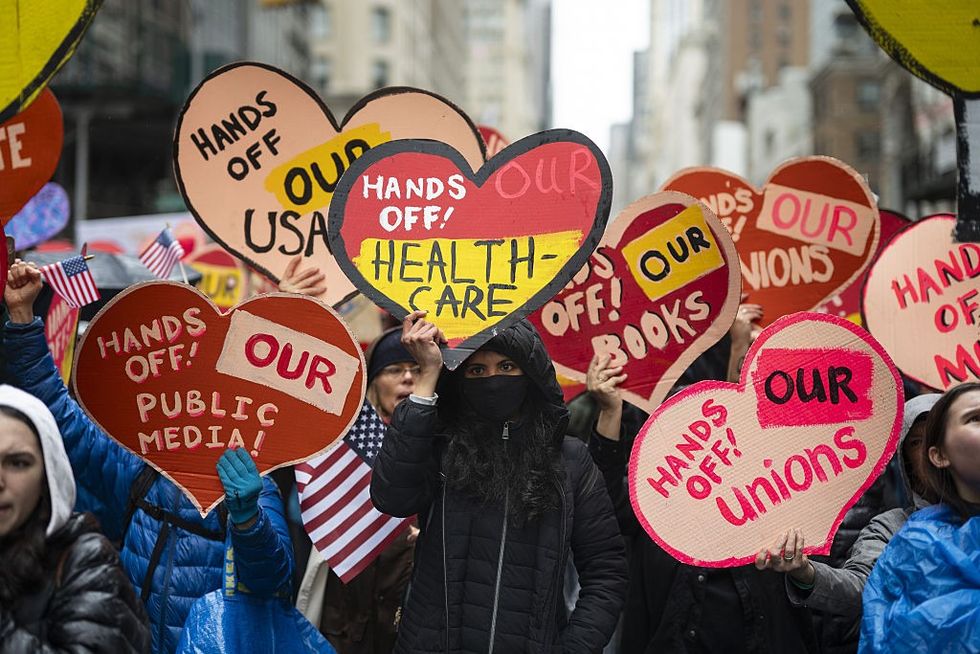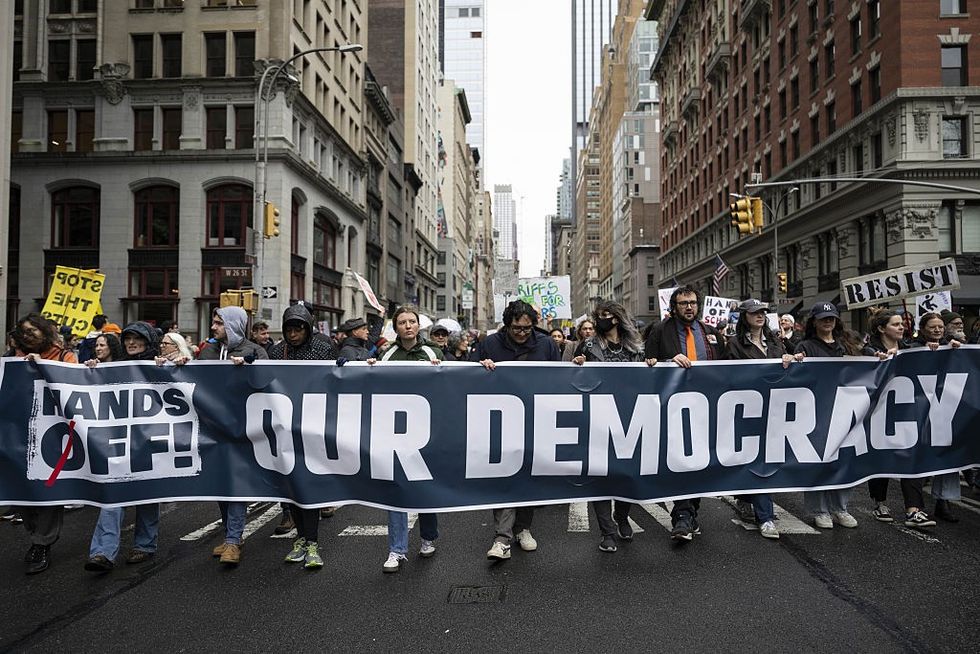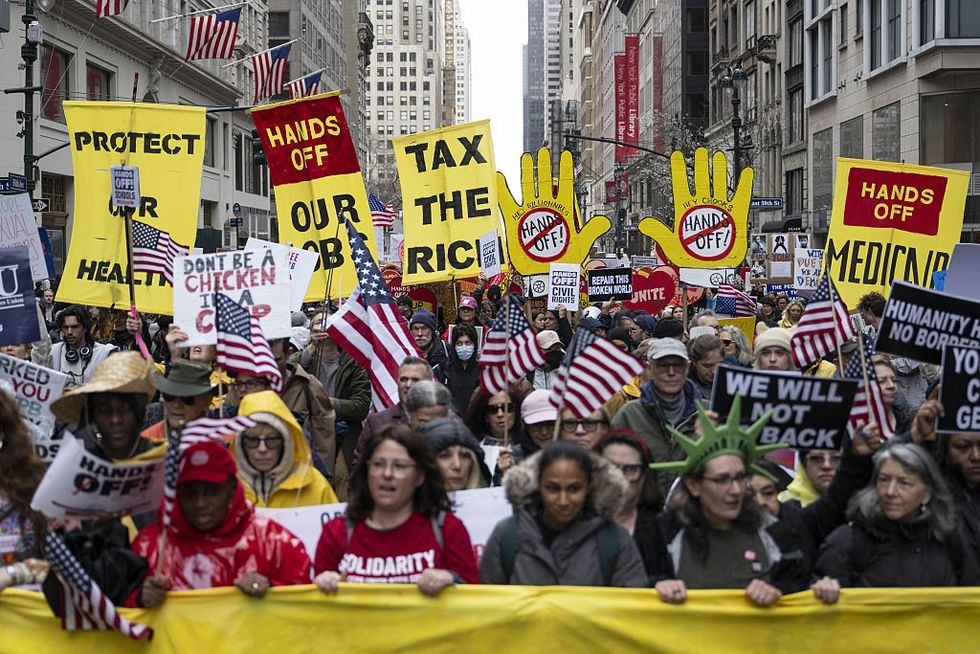

SUBSCRIBE TO OUR FREE NEWSLETTER
Daily news & progressive opinion—funded by the people, not the corporations—delivered straight to your inbox.
5
#000000
#FFFFFF
To donate by check, phone, or other method, see our More Ways to Give page.


Daily news & progressive opinion—funded by the people, not the corporations—delivered straight to your inbox.
Unified and spirited opposition to Trump's destructive rampage is exactly what's needed, but a successful movement will not grow without a vision and proposals to support it.
On Saturday, April 5th, fifty-seven years after Martin Luther King, Jr. was assassinated, hundreds of thousands of protestors gathered across the country to challenge Trump’s attack on, well, just about everything!
I went to the rally in New Jersey, where speaker after speaker had us chanting “Hands off our Social Security!” “Hands off our Medicare!” Hands off our Medicaid!” “Hands off our Abortion Rights!” and so on. This was the national theme developed by the Democratic Party.
A few protestors in the back chanted “Hands off Gaza,” which was not on the agenda. But they soon retreated into silence. One woman carrying a large Trump 2024 banner walked near the edge of the crowd of about 2,000 and took on a few angry shouts, but there was no confrontation. Tensions rose enough, however, that the chair of the gathering did feel obliged to remind us that this was a peaceful, non-violent gathering.
As I looked around at the well-healed demonstrators from our liberal town, I couldn’t help but imagine adding a few other items to the list: “Hands off our IRA’s!” “Hands off the Stock Market!” “Hands off Free Trade!” I’m sure that would have been right on the money.
But why was I raining on this parade? After all, these were my neighbors, good caring people who turned up on this rainy Saturday because they truly want to make our society a better place.
My mind went negative because it was crystal clear that the rally was the opposite of Martin Luther King Jr.’s challenge to the established order that enabled Jim Crow and persistent poverty. Dr. King asked us to envision massive changes to the status quo. Today, we were chanting to defend the status quo that Trump is surely taking a wrecking ball to.
The Democrats who put the rallies together across the country missed a moment to present an alternative vision. This was a chance to announce new proposals to tame runaway inequality, the growth of which has undermined the Democratic Party’s coalition, and to provide job insecurity, the lack of which has given MAGA a foothold in the first place.
Instead, we got pure opposition, spirited to be sure. Its only virtue was to provide collective support to those of us who have been stunned by the revanchist thrust of Trumpism. We can’t believe what is happening and we need each other to shore up our spirits. It was a chance, feeble but necessary, to show some form of communal defiance.
But a successful movement will not grow without a vision and proposals to support it. Why didn’t the Democrats do that? Because, except for a few fellow-travelers like Bernie Sanders, their vision is deeply tied the status quo BT (Before Trump).
That set of BT institutions was working well for the top 20 percent of the income distribution, especially those with college and post-graduate degrees, including just about everyone at our town’s demonstration.
It was not working for those whose jobs had been shipped abroad to China, Mexico, or elsewhere, and who watched their communities then crumble.
It also wasn’t working so well for those who lost their jobs to finance Wall Street stock buybacks and outrageous CEO salaries.
And it wasn’t working well at all for those working at poverty wages, especially immigrant workers, risking life and limb with little protection.
In short, the Democratic Party, long the party of the working class, has no compelling vision today because it has left behind a big chunk of the working-class. As analysts debate what went wrong, they should perhaps ask why the Democrats are so reluctant to support a working-class populist agenda.
The answer lies in how it became the party of the established order and therefore was unable to provide a vision that makes sense to working people who have been screwed by the established order. (Please see Wall Street’s War on Workers.)
And that’s a damn shame. Because we want and need to be inspired by a positive vision. But that will only happen when the Democrats take their hands off their imaginations and ours.
We need to return to the days when the vision was FDRs for four freedoms, not four family tax credits to support the “opportunity society.”
The Democrats still have a chance, the field is open, but really? That is not likely to happen until it is challenged by a new independent party that stands for substantive change, created by and for working people.
I’ll be demonstrating for that.
"Privatized Medicare plans are denying patients the care they need, while defrauding the government of billions a year," said one advocacy group. "Donald Trump is giving them even more taxpayer money."
The federal agency now headed by former television host Mehmet Oz announced Monday that it is substantially boosting payments to privately run Medicare Advantage plans, a boon for an industry notorious for overcharging taxpayers and denying patients necessary care.
The Centers for Medicare and Medicaid Services (CMS) said it is jacking up payments to Medicare Advantage (MA) plans by more than 5% for 2026—an increase of over $25 billion. That's more than double the increase proposed by the Biden administration.
Health insurance company stocks jumped in response to the news of the Trump administration's payment hike, with shares of UnitedHealth Group—the largest provider of Medicare Advantage plans—rising more than 6% following the CMS statement.
Oz, whom the Republican-controlled Senate confirmed in a party-line vote last week, previously reported holding tens of millions of dollars worth of stock in companies with interests before CMS, including UnitedHealth.
Social Security Works, a progressive advocacy group that campaigns against Medicare Advantage,
said Monday that "privatized Medicare plans are denying patients the care they need, while defrauding the government of billions a year."
"Trump is giving them even more taxpayer money," the group wrote on social media. "Trump-Musk don't care about 'efficiency.' They care about stealing our money."
"Medicare Advantage is wasteful and inefficient relative to traditional Medicare and everyone knows it."
One industry analyst, Chris Meekins of the financial services firm Raymond James, toldAxios that the payment boost for Medicare Advantage "leads one to believe that DOGE"—the Elon Musk-led advisory commission also known as the Department of Government Efficiency—"does not care about MA."
Healthcare writer Natalie Shure
called the payment increase a clear "illustration that this administration's goal is upward wealth distribution and the dismantling of public goods, not 'efficiency.'"
"Medicare Advantage is wasteful and inefficient relative to traditional Medicare," Shure added, "and everyone knows it."
The CMS announcement came weeks after Oz told Sen. Elizabeth Warren (D-Mass.) during his confirmation hearing that he is concerned about and prepared to "go after" Medicare Advantage upcoding, the practice of making patients appear sicker than they actually are to reap larger government payments.
The Wall Street Journalreported Monday that the Trump administration did opt to "stick with a Biden administration policy change that limits certain billing practices that have boosted payments to Medicare Advantage insurers," despite industry objections to the policy.
But Oz's record, including his past support for a proposal dubbed "Medicare Advantage for All," has led watchdog groups to doubt that he intends to aggressively take on large-scale overpayments and fraud in the program. According to one estimate from 2023, Medicare Advantage plans are overcharging U.S. taxpayers by up to $140 billion a year.
Robert Weissman, co-president of Public Citizen, warned after his Senate confirmation that Oz will "seek to further privatize Medicare, increasing the risk that seniors will receive inferior care and further threatening the long-term health of the Medicare program."
"Dr. Oz is joining a team of snake oil salesmen and anti-science flunkies that have already shown disdain for the American people and their health," said Weissman.
In addition to Oz and Robert F. Kennedy Jr. at the Department of Health and Human Services, which oversees CMS, Trump appointed former Medicare Advantage lobbyist Don Dempsey as associate director for health at the Office of Management and Budget, another signal that the administration intends to be an ally to the MA industry.
"Thank you to the hundreds of thousands of Americans across the country who are standing up and speaking out for our voting rights, fundamental freedoms, and essential services like Social Security and Medicare."
In communities large and small across the United States on Saturday, hundreds of thousands of people collectively took to the streets to make their opposition to President Donald Trump heard.
The people who took part in the organized protests ranged from very young children to the elderly and their message was scrawled on signs of all sizes and colors—many of them angry, some of them funny, but all in line with the "Hands Off" message that brought them together.
"Thank you to the hundreds of thousands of Americans across the country who are standing up and speaking out for our voting rights, fundamental freedoms, and essential services like Social Security and Medicare," said the group Stand Up America as word of the turnout poured in from across the country.
A relatively small, but representative sample of photographs from various demonstrations that took place follows.
Demonstrators gather on Boston Common, cheering and chanting slogans, during the nationwide "Hands Off!" protest against US President Donald Trump and his advisor, Tesla CEO Elon Musk, in Boston, Massachusetts on April 5, 2025. (Photo by Joseph Prezioso / AFP)


















